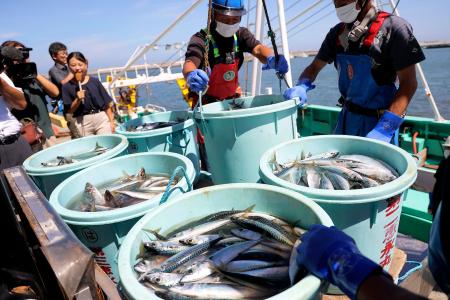
- ARAB NEWS
- 12 Jul 2025

TOKYO: New Japanese Agriculture, Forestry and Fisheries Minister Ichiro Miyashita has expressed his intention to work on diversifying export destinations to reduce risks in the wake of China’s blanket import ban on aquatic products from Japan.
“Russia’s invasion of Ukraine has led to spikes in prices for and shortages of fertilizers and feed, and it is becoming clear that Japan depends too much on certain countries for procurement,” Miyashita said in an interview with media organizations including Jiji Press.
He said: “It is important to reduce risks from the standpoint of economic security. We will redouble efforts to make sure that Japan can import food and production materials stably.”
China introduced the all-out import ban on Japanese fishery products in response to the start on Aug. 24 of the release of treated water containing tritium, a radioactive substance, into the ocean from Tokyo Electric Power Company Holdings Inc.’s meltdown-stricken Fukushima No. 1 nuclear power station, which was damaged in the March 2011 earthquake and tsunami.
Miyashita, who took up the ministerial post in a cabinet reshuffle on Wednesday, stressed that the government will maintain its targets of increasing Japan’s exports of agriculture, forestry and fishery goods and food to 2 trillion yen in 2025 and to 5 trillion yen in 2030. Such exports totaled 1.4 trillion yen in 2022.
“We have now realized that exporting scallops in large volume to China is risky, so we are ready to work on diversifying export destinations,” he said. “We aim to find markets where we can sell high-quality Japanese food most effectively, and step up promotion activities.”
Asked about the weakening production foundations, Miyashita said, “In particular, we need to drastically revamp the farm production system, which was created during the time when the country’s population was increasing, but the work has been delayed.”
He said: “Considering our country’s supply-demand situation for food, we need more and more farmland. Now is the time to change our mindset and start thinking about how we should make the most of farmland with a small number of people. We are at a turning point toward developing agriculture into a growth industry.”
On ways to revitalize mountainous areas, Miyashita said, “Increasing human-to-human interactions is key to overcoming the issue of depopulation.”
“Mountainous areas would reap economic benefits if restaurants and ‘minpaku’ lodging facilities run by farmers are established,” he said, adding, “It is necessary to revitalize mountainous areas with various measures while boosting their attractions to correct the overconcentration in Tokyo.”
JIJI Press